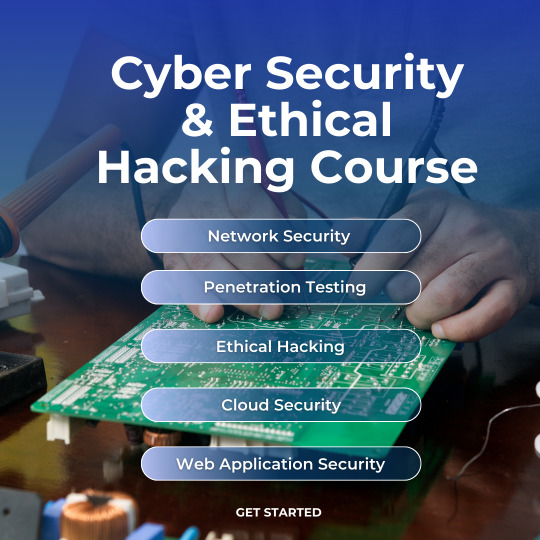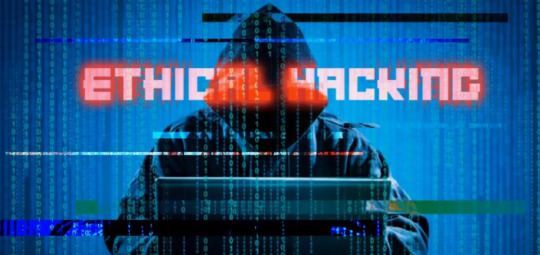#ethical hacking certification
Explore tagged Tumblr posts
Text

Six months of ethical hacking training in the areas of cybersecurity basics, vulnerabilities of network and systems, wireless and web security, and preparation for CEH exams using lab sessions and actual techniques.
#Ethical Hacking#Ethical Hacking Course#Learn Ethical Hacking#Ethical Hacking Training#Ethical Hacking Certification
1 note
·
View note
Text
Earn a Certification in Ethical Hacking to Advance Your Career in Cybersecurity

Cybersecurity has turned into a critical topic the world over in the modern digital age-Governments, corporations, and private citizens have become targets of assailants. The increase in cyberattacks has led to organizations concentrating on seeking competent professionals who can protect their systems and data from malicious threats. An Ethical-Hacking Certification is one of the best ways to convince the world that you are an authority in this area. The certification validates your skills as an Ethical Hacker and gives you access to lucrative job prospects in various organizations worldwide.
Ethical hacking: what is it?
In order to evaluate an organization's defenses, ethical hacking, sometimes referred to as penetration testing or white-hat hacking, entails getting into systems and gadgets lawfully. In contrast to malevolent hackers, ethical hackers use their expertise to find holes and flaws in systems, assisting companies in improving their security posture. In order to stop data breaches, monetary losses, and harm to one's reputation, ethical hackers are essential.
Why Pursue an Ethical Hacking Certification?
High Demand for Cybersecurity Professionals
The gap in the global cyber workforce is widening further with each passing day, with millions of vacancies left unfilled worldwide. Organizations are on the lookout for certified ethical hackers who can help them defend their digital assets. You are putting yourself as one of the most wanted professionals in this competitive field by getting one ethical hacking certification.
Skill-Wise, an All-Inclusive Program
An ethical hacking certification consists of numerous subjects, such as network security, vulnerability assessment, malware analysis, and incident response, among others. These programs offer practical training context and reality scenarios, allowing you to gain real-world skills which you can apply to your job immediately.
Acknowledged Recognition in the Industry
There are certifications like Certified Ethical Hacker (CEH), Offensive Security Certified Professional (OSCP), and CompTIA PenTest+, which are recognized and respected globally. They show your commitment to ethical hacking and the protection of organizations against cyber threats.
Amazing Career Options
Ethical hackers are some of the best-paid professionals in the IT industry. In recent surveys, certified ethical hackers have been reported to earn an average salary of
90,000–90,000to120,000 annually, depending on experience and location. In addition, other career positions which are in high demand are penetration tester, security analyst, and cybersecurity consultant.
Keep the Digital World Safer
As an ethical hacker, you will be molding a secure internet. You are shielding sensitive data by locating and fixing security vulnerabilities, preventing cyberattacks, and protecting the privacy of people and organizations.
Popular Ethical Hacking Certifications
There are several prestigious certifications one could consider if thinking about a career in ethical hacking:
Certified Ethical Hacker (CEH)
Given by EC-Council CEH is the most famous certification for aspiring ethical hackers. Topics covered include footprinting, scanning, enumeration, and system hacking.
Offensive Security Certified Professional (OSCP)
The OSCP certification is distinguished by its extremely difficult hands-on exam, which obliges candidates to exploit vulnerable machines successfully. This is excellent for the candidate proving their hands-on assessment skills on penetration testing.
CompTIA PenTest+
This is an intermediate-level cybersecurity certification that deals with planning, scoping, and management of penetration tests, along with result analysis.
GIAC Penetration Tester (GPEN)
GPEN is the certification from Global Information Assurance Certification(GIAC) that assesses that you are able to conduct penetration tests and exploit vulnerabilities.
How to Get Started
To get certified as an ethical hacker, you might follow these steps:
Build A Strong Foundation
Develop an understanding of networks, operating systems, and programming languages like Python and Bash. Get familiar with cybersecurity concepts and tools.
Choose the Better Certification
Do some research on the various certifications, and choose one that fits your career goals and the experience required.
Sign In for Training
Formal training or coursework is required by many certifications. Therefore, look for an accredited training provider in your area, and see what courses they offer on ethical hacking.
Practice, Practice, and Practice
Ethical hacking is a hands-on field: Build a lab where you can practice your skills and tools like Metasploit, Wireshark, and Nmap.
Pass the Certification Exam
Prepare for the certification exam with study materials, many practice tests, relevant online forums, or joining a study group.
Conclusion
An Ethical Hacking Certification is more than a credential; it is your entrance to a meaningful career in cybersecurity. With this certification under your belt, you will gain the know-how, skills, and importance to defend organizations against cyber threats and show them a difference in the digital world. Whether to be a fresher or to be sure of already grown into an IT professional, now is perhaps the best time to invest in your future and become a certified ethical hacker. So step forward today and give that extra thrust to your life in this fast-growing field.
0 notes
Text
Cybersecurity Education: Your Path to Becoming a Digital Guardian in an Ever-Changing Landscape
In an era dominated by digital technologies, the importance of cybersecurity has never been greater. As cyber dangers and attacks proliferate, the requirement for qualified professionals capable of protecting against them grows. In this article, we look at how cybersecurity education can help individuals become digital guardians in an ever-changing landscape of cyber threats.
The Growing Importance of Cybersecurity:
With the fast proliferation of digital infrastructure and the increasing interconnection of systems, potential vulnerabilities and dangers have grown dramatically. Organizations in all industries confront ongoing risks to their digital assets, ranging from large-scale data breaches to sophisticated ransomware assaults. As a result, there is an urgent demand for skilled cybersecurity specialists who can predict, detect, and successfully neutralize these risks.
Cybersecurity Education: Laying the Groundwork:
Cybersecurity education sets the framework for individuals to obtain the skills and knowledge required to address the wide range of difficulties provided by cyber attacks. Students learn about basic concepts like network security, cryptography, threat analysis, and incident response through comprehensive training programmes. Furthermore, they learn about emerging technologies and dynamic attack vectors, which prepares them to respond to changing threat landscapes.
Practical Experience and Hands-on Learning:
One of the distinguishing features of cybersecurity education is the emphasis on practical experience and hands-on learning. Students can use their theoretical understanding in real-world circumstances by modeling cyber attacks and defense techniques in controlled conditions. By participating in practical exercises including penetration testing, vulnerability assessments, and forensic analysis, students gain vital skills that may be applied directly to industry.
Specialization and certification:
Cybersecurity education provides a wide number of specialization options, allowing students to personalize their learning experience to their specific interests and professional aspirations. Whether they specialize in network security, cloud security, ethical hacking, or digital forensics, students can pursue certificates and qualifications that confirm their cybersecurity skills. These qualifications not only boost credibility, but they also strengthen employment prospects in a competitive labor environment.
Addressing the skill gap:
Despite the increasing demand for cybersecurity workers, there is a major skills gap in the business. Individuals who invest in cybersecurity education not only position themselves for profitable career prospects, but they also help to close the essential skills gap. Cybersecurity experts play an important role in boosting organizations' overall security posture and protecting digital assets from changing threats by engaging in continuous learning and professional development.
Conclusion:
In conclusion, cybersecurity education is the foundation for those seeking to become digital guardians in an ever-changing landscape of cyber threats. Students who get the necessary information, skills, and certifications can pursue rewarding jobs in cybersecurity, where they play an important role in defending against malicious actors and protecting the integrity of digital systems. As technology advances, the demand for qualified cybersecurity experts will grow, making cybersecurity education more important than ever.
Join the CACMS Institute for comprehensive cybersecurity education today. Receive hands-on practical instruction and guidance from our seasoned experts. Take the first step towards becoming a digital guardian in the ever-changing world of cyber threats.
For further information and to enroll, please call +91 8288040281 or visit CACMS!
Secure your future in cybersecurity with CACMS Institute.
#cacms institute#cacms#techeducation#techskills#digital landscape#ethical hacking course#ethical hacking training#ethical hacking course in Amritsar#ethical hacking certification#Cybersecurity education#cybersecurity course in amritsar
0 notes
Text

“To beat a hacker, think like one” Ethical hacker Not leaves behind any evidence that they were there. Ethical hackers earn ₹3,18,370 and above per month. We prepare for (CEH), (OSCP), (and CPT) Certification for newbies to professionals. Get hold of us today.
Contact us: +91 9315519124 / +91 8287266809 Email: [email protected] Website: https://www.eduvatech.com/
#learningopportunity#studynoida#learning #learningindias
#online cyber security in noida#online ethical hacker training#eduvatech#ethicalhacking#online courses#online training#ethical hacking certification#ethical hacking course#ethical hacking training#online study adcademy#online study
0 notes
Text
Staying Relevant: Balancing Learning and Life as an Ethical Hacker
Have you experienced burnout while trying to develop your skills and you just don't have the time to do everything? Finding balance is the key to improving your skills in a healthy way. In this article, I explore healthy habits to grow without burning out
You’ve heard it before – cybersecurity is a field that evolves at a blindingly fast pace. The tools, techniques, and technologies threatening networks transform rapidly. As an ethical hacker, your skills can become obsolete within months if you aren’t continuously upgrading your knowledge. Point #4 on our hacker roadmap deals with knowing the latest and greatest when it comes to the state of…

View On WordPress
#burnout#certifications#conference#continuous learning#Cyber Security#cybersecurity education#cybersecurity skills#Ethical Hacking#hacker skills#infosec community#leadership#learning plan#maintaining balance#microlearning#Penetration Testing#pentesting methodologies#personal development#podcast#red team operations#security news#security policies#security tools#time management#trends#vulnerability assessments#work-life balance
3 notes
·
View notes
Text

Master AI in Cybersecurity with CEH v13 – Learn, Certify & Compete
Master AI in cybersecurity with CEH v13! Gain real-world skills in 5 days with 20 modules & 221+ labs. Learn, certify, and compete—start your journey today!
Visit: https://www.eccouncil.org/train-certify/certified-ethical-hacker-ceh/
0 notes
Text
Cybersecurity: The Key to Protecting Your Digital Identity and Privacy
In an era where our lives are increasingly connected with the digital sphere, protecting our digital identity and privacy has become critical. With the exponential growth of online activities, from social media interactions to financial transactions, the risks of cyber attacks are greater than ever before. In this digital age, cybersecurity has emerged as the primary shield protecting our digital life.
Understanding The Threat Landscape
Cyber risks take many forms, including data breaches, identity theft, malware, and phishing attempts. These dangers jeopardize sensitive personal information while also undermining trust in online systems and services. As technology advances, so do fraudsters' strategies, making it critical for individuals to be cautious and knowledgeable about cybersecurity best practices.
Significance of Digital Identity Protection
Our digital identities contain a variety of data, including personal information, financial records, and online behaviors. Securing this information is critical not only to prevent identity theft, but also to maintain our reputation and reliability in the digital sphere. A compromise of our digital identity can have serious ramifications for our financial stability, professional chances, and even our personal relationships.
Preserving Privacy in the Digital Age
Privacy is the foundation of individual freedom and liberty. However, in today's hyper-connected society, keeping privacy has grown more difficult. From surveillance technologies to data mining tactics, our online activities leave digital trails that dangerous actors can exploit. Cybersecurity measures are critical in protecting our privacy rights by ensuring that our personal information stays safe and protected from unauthorized access.
Empowering Individuals with Cybersecurity Education
While cybersecurity dangers may appear frightening, individuals may empower themselves by learning and developing cybersecurity skills. Education is an excellent technique for combating cyber threats because it teaches people how to detect possible risks, minimize vulnerabilities, and respond effectively to security crises. Individuals who invest in cybersecurity education improve not only their own digital safety but also the broader resilience of cyberspace.
Conclusion
In an increasingly linked world, cybersecurity is the foundation of our digital security and privacy. Individuals who recognise the importance of preserving their digital identity and privacy can take proactive efforts to reduce cyber risks and protect themselves from online dangers. We can create a safer and more secure digital future for ourselves and future generations by promoting cybersecurity education, awareness, and adherence to best practices.
Remember that in the digital world, cybersecurity is no longer an option—it is a requirement. Let's work together to protect our digital identities and privacy rights in an ever-changing online world.
Ready to take charge of your digital security? Join CACMS Institute today for comprehensive cybersecurity training that will provide you with hands-on practical skills and professional assistance.
Enroll in our Cyber Security Course in Amritsar and obtain the knowledge and competence required to properly protect your digital identity and privacy. Our professional teaching staff ensures that you receive a high-quality education and personalized attention throughout your learning journey.
Protect yourself online before it's too late. Contact us at +91 8288040281 or visit cacms.in to learn more about our Cyber Security Course in Amritsar and begin your path to a secure digital future now.
#cacms institute#cacms#techskills#techeducation#cyber security course in amritsar#cyber security#data privacy#digital identity#protecting digital Identity#ethical hacking course#ethical hacking training#ethical hacking certification#best computer institute in amritsar
0 notes
Text
Strengthening Cyber Resilience in Supply Chains: Preparing for Future Attacks

In today’s interconnected world, supply chains are a crucial part of business operations. However, with this connectivity comes increased vulnerability to cyber threats. Organizations must proactively develop cyber resilience strategies to protect against attacks, maintain business continuity, and adapt to evolving cyber risks.
What is Cyber Resilience in Supply Chains?
Cyber resilience is an organization's ability to anticipate, withstand, recover from, and adapt to cyber threats. Unlike cybersecurity, which primarily focuses on prevention, cyber resilience ensures that operations can continue even in the face of an attack. Given the complexity of supply chains—with multiple vendors, digital systems, and geographical reach—adopting a cyber-resilient approach is vital.
The Rising Threats to Supply Chains
Supply chains are attractive targets for cybercriminals due to their vast networks and reliance on third-party vendors. Some of the biggest cyber risks include:
Ransomware Attacks – Hackers encrypt crucial supply chain data and demand a ransom for its release.
Phishing & Social Engineering – Cybercriminals use deceptive emails or messages to trick employees into revealing sensitive information.
Malware Infiltration – Malicious software can spread across supply chain networks, causing disruptions.
Third-Party Vulnerabilities – Weak security measures by vendors can expose the entire supply chain to cyber threats.
Data Breaches – Attackers exploit security loopholes to access and steal confidential business or customer information.
To mitigate these risks, organizations must establish strong cyber resilience strategies.
Essential Cyber Resilience Strategies for Supply Chains
1. Conduct Thorough Risk Assessments
A proactive stance on cyber resilience starts with a comprehensive risk assessment. This involves:
Identifying critical assets and their dependencies.
Evaluating vulnerabilities across the supply chain ecosystem.
Assessing third-party security risks.
Developing targeted risk mitigation measures.
2. Adopt a Zero Trust Security Model
The Zero Trust approach ensures that no system, user, or device is automatically trusted. It includes:
Rigorous authentication for all users and devices.
Implementing least privilege access, ensuring users only access necessary data.
Using network segmentation to contain potential breaches.
3. Strengthen Third-Party Security Controls
Since third-party vendors can be a weak link, organizations must:
Set clear security expectations in vendor agreements.
Regularly audit and assess supplier security postures.
Enforce robust authentication and encryption standards.
4. Enhance Endpoint and Network Protection
Strong security measures must be implemented across all devices and networks, such as:
Deploying firewalls and intrusion detection/prevention systems.
Utilizing endpoint detection and response (EDR) tools.
Encrypting sensitive data to prevent unauthorized access.
5. Promote a Culture of Cybersecurity Awareness
Employees play a crucial role in cyber resilience. Organizations should:
Conduct regular training on phishing detection and cybersecurity best practices.
Simulate cyber incidents to improve response readiness.
Foster a culture where security is a shared responsibility across the supply chain.
6. Develop and Test an Incident Response Plan
Having a solid incident response plan (IRP) is essential for minimizing damage in case of an attack. This involves:
Clearly defining roles and responsibilities for cyber incident management.
Creating protocols for quick containment and recovery.
Running simulated attack scenarios to ensure the IRP remains effective.
7. Utilize Threat Intelligence and Continuous Monitoring
Staying ahead of cyber threats requires ongoing vigilance. Organizations should:
Subscribe to threat intelligence feeds for real-time insights.
Implement Security Information and Event Management (SIEM) tools.
Continuously monitor networks for anomalies and suspicious activities.
8. Invest in Cyber Security Professional Courses
Building cyber resilience requires skilled professionals who understand the latest threats and best practices. A great way to enhance cybersecurity expertise is through structured training programs like the Boston Institute of Analytics' Cyber Security Certificate Program in Thane. This program offers hands-on learning in:
Cyber threat analysis and response strategies.
Digital forensics and incident handling.
Ethical hacking and network security.
Compliance regulations and risk management.
Enrolling in such programs helps supply chain professionals strengthen their cybersecurity skills, contributing to a more secure and resilient business environment.
Final Thoughts
Cyber resilience is no longer just an option—it’s a necessity for modern supply chains. As cyber threats continue to evolve, organizations must adopt a proactive approach by enforcing strict vendor security measures, implementing advanced security frameworks like Zero Trust, and fostering a culture of cybersecurity awareness. By leveraging continuous monitoring, threat intelligence, and expert training programs, businesses can build a robust cyber resilience strategy and prepare for the next wave of cyberattacks.
#Learn Ethical Hacking#Cyber security Professional Courses#Cyber Security Course#Cyber Security Certificate Program in Thane
0 notes
Text
The Best Online Platforms for Learning Ethical Hacking (Legally Becoming the Sherlock Holmes of Cybersecurity)
Want to learn how to hack… for good? Ethical hacking is your ticket to being the cool cyber-whiz that saves the day rather than causes chaos. If the idea of spotting security weaknesses and preventing breaches makes you feel like a digital superhero, you’re in the right place. But before you go all Mr. Robot, you need to get some serious training under your belt. The good news? There are tons of…
#best hacking courses#cybersecurity certifications#ethical hacking for beginners#ethical hacking platforms#learn ethical hacking online
0 notes
Text
Coding and Scripting for Beginner Hackers
Learning to code and write scripts is a crucial skill for getting into ethical hacking and cybersecurity. Scripting allows you to automate repetitive tasks, develop your own custom tools, analyze data, and program everything from small hacking tools to machine learning models. Understanding and knowing how to code in different languages can be extremely useful when doing deep dives into malware…

View On WordPress
#Cyber Security#cybersecurity careers#Ethical Hacking#hacer certifications#hacking for beginners#hacking guide#hacking homelab#infosec#learn to code#learn to hack#Penetration Testing#Pentesting
4 notes
·
View notes
Text
Why PMP Certification is Essential for Project Managers
The Project Management Professional (PMP) Certification is designed for professionals aiming to excel in their careers. It showcases your ability to lead projects with precision and confidence. Accredited by the Project Management Institute (PMI), this globally recognized credential boosts your credibility and earning potential. PMP-certified professionals often see higher salaries and better job opportunities. The certification also enhances your knowledge of agile, waterfall, and hybrid project management approaches. If you're ready to elevate your project management career, investing in PMP Certification is a decision that pays long-term dividends.
0 notes
Text
Boost Your Cybersecurity Career with an Ethical Hacking Certification

In today’s rapidly evolving digital landscape, cybersecurity has become a paramount concern for businesses and organizations. With cyber threats becoming more sophisticated, the demand for skilled professionals to safeguard sensitive data and systems has surged. One of the most effective ways to break into this high-demand field is through Ethical Hacking Certification. This article explores why ethical hacking certification is crucial, the benefits it offers, and how it can enhance your career in cybersecurity.
What is Ethical Hacking?
Ethical hacking, also known as penetration testing or white-hat hacking, involves legally testing and probing computer systems and networks for vulnerabilities. Ethical hackers use the same techniques and tools as malicious hackers but do so with the permission of the organization they are working for, with the goal of improving security rather than exploiting weaknesses.
Ethical hackers identify potential vulnerabilities in a system, report them to the organization, and offer advice on how to mitigate risks. As the threat landscape continues to evolve, the need for professionals who can stay one step ahead of cybercriminals has never been greater.
Why Pursue an Ethical Hacking Certification?
An Ethical Hacking Certification provides a structured pathway to develop the necessary skills to become an expert in the field of ethical hacking. Here’s why pursuing this certification is a smart decision:
1. Industry Recognition
Ethical hacking certifications, such as Certified Ethical Hacker (CEH), Certified Information Systems Security Professional (CISSP), and Offensive Security Certified Professional (OSCP), are globally recognized credentials that demonstrate your proficiency in cybersecurity. These certifications are respected by employers and can give you a competitive edge in the job market.
2. Hands-On Knowledge
Certifications often involve practical training, which allows you to apply your knowledge in real-world scenarios. You will learn how to conduct penetration testing, analyze security flaws, and understand the tools used by cybercriminals. This hands-on experience is invaluable and will set you apart from candidates without formal training.
3. High Demand and Lucrative Salaries
The increasing frequency of cyberattacks means companies are actively seeking qualified ethical hackers to protect their assets. According to recent reports, the demand for ethical hackers is expected to grow significantly over the next decade. With this growth comes the potential for high-paying job opportunities, with certified professionals earning salaries that reflect their expertise.
4. Career Flexibility
An ethical hacking certification opens doors to various career paths, including penetration tester, cybersecurity analyst, network security engineer, and IT security consultant. Whether you want to work for a corporation, government agency, or as an independent contractor, the versatility of this certification allows you to pursue different roles within cybersecurity.
5. Continuous Learning and Advancement
Cybersecurity is a dynamic field, and staying ahead of the latest threats and technologies is crucial. Ethical hacking certification programs often include ongoing education and advanced courses, enabling you to keep your skills up to date and further your expertise. This continuous learning can help you climb the career ladder and take on more complex security challenges.
How to Get Certified in Ethical Hacking?
While the path to becoming an ethical hacker may seem daunting, it’s entirely achievable with the right resources and commitment. Here are the general steps to obtain your ethical hacking certification:
1. Choose a Certification Program
The first step is to select a certification program that aligns with your career goals. Popular programs include:
Certified Ethical Hacker (CEH): This is one of the most recognized certifications in the field, covering topics such as network security, cryptography, and web application security.
Offensive Security Certified Professional (OSCP): Known for its challenging and hands-on approach, OSCP is designed for individuals who want to demonstrate their ability to conduct penetration testing on their own.
CompTIA Security+: A beginner-friendly certification that covers basic cybersecurity concepts, ideal for those new to the field.
2. Meet the Eligibility Requirements
Some certification programs require prior experience or knowledge in networking, IT security, or system administration. For example, the CEH program requires at least two years of work experience in the Information Security domain or completing an official training program.
3. Complete Training
Whether through self-study, online courses, or formal training programs, ensure you are fully prepared for the certification exam. Hands-on labs, practice tests, and study groups can help reinforce the concepts you learn.
4. Pass the Exam
Most ethical hacking certifications require you to pass an exam that tests your theoretical knowledge and practical skills. The exam typically includes multiple-choice questions, practical simulations, and case studies that assess your ability to apply ethical hacking techniques.
Conclusion
Ethical hacking certification is an excellent investment for anyone looking to build a career in cybersecurity. With the increasing threat of cyberattacks, businesses need ethical hackers more than ever to protect their digital assets. By earning a recognized certification, you can gain the skills, knowledge, and credibility needed to thrive in this growing industry.
0 notes
Text
CEH v13 Online Training Master Ethical Hacking
Cybersecurity has become one of the most critical fields in today’s digital age. The Certified Ethical Hacker (CEH v13) certification, offered by EC-Council, is one of the most recognized credentials for professionals aiming to secure computer systems against cyber threats. This certification teaches you to think like a hacker while equipping you with the tools to counteract malicious attacks.
With CEH v13 online training, learning these skills has become more accessible, allowing aspiring ethical hackers to develop expertise at their convenience. below is the reference links :
#EC-Council Training#Ethical Hacking Techniques#Cybersecurity Certification#CEH v13 Online Training#Certified Ethical Hacker (CEH)
0 notes
Text
Mastering Cybersecurity with Tabletop Exercises (TTX): A Comprehensive Guide

Cyber threats are constantly evolving, and organizations must stay prepared to handle potential security incidents. One of the most effective ways to strengthen an organization’s cybersecurity strategy is through Tabletop Exercises (TTX). These exercises are discussion-based simulations that help teams analyze and refine their response to cybersecurity threats in a structured setting.
A Tabletop Exercise (TTX) helps organizations test their cybersecurity response plan, uncover weaknesses, and improve coordination among stakeholders. It is a proactive way to ensure that security teams and decision-makers can efficiently respond to cyber incidents.
Why Are Tabletop Exercises Important?
Tabletop Exercises serve several critical functions in an organization’s cybersecurity preparedness:
Strengthening Incident Response – Teams gain a better understanding of their roles and responsibilities in the event of a security breach.
Assessing Security Protocols – The exercise helps evaluate how effective current security measures and policies are.
Boosting Team Coordination – Cross-functional teams, including IT, legal, and executive leadership, work together to enhance cybersecurity awareness.
Identifying Security Gaps – TTX exposes vulnerabilities in an organization’s defences and response plans.
Meeting Compliance Requirements – Many industries require businesses to conduct TTX as part of cybersecurity compliance.
How a Cybersecurity Tabletop Exercise Works
A TTX session follows a well-structured approach to maximize effectiveness:
1. Planning the Exercise
Defining the Goals – Organizations determine what they aim to achieve with the exercise, such as testing responses to ransomware attacks or phishing schemes.
Selecting Participants – IT security teams, compliance officers, legal advisors, and senior executives take part in the session.
Creating a Realistic Scenario – A credible cyber threat scenario is developed to test incident response strategies.
Setting Boundaries – A defined scope ensures discussions remain focused and productive.
2. Running the Exercise
Presenting the Scenario – Facilitators introduce the cyber attack scenario, outlining key details.
Team Discussions – Participants analyze the threat and discuss how to handle the situation.
Adding Challenges – Additional complications, such as regulatory involvement or media exposure, test the team’s ability to adapt.
3. Reviewing and Improving
Identifying Strengths & Weaknesses – The team assesses what worked and what needs improvement.
Providing Recommendations – Adjustments to cybersecurity policies and incident response procedures are proposed.
Implementing Changes – Organizations take corrective actions to enhance their overall security posture.
Different Types of Tabletop Exercises
Organizations can customize TTX sessions based on their specific cybersecurity goals:
Technical TTX – Designed for IT security professionals to test their technical response to cyber threats like malware and ransomware attacks.
Operational TTX – Involves multiple departments, including PR and legal teams, to assess organizational responses beyond just IT security.
Compliance-Focused TTX – Helps ensure adherence to frameworks like ISO 27001, NIST, PCI DSS, HIPAA, and GDPR.
Executive-Level TTX – Tailored for senior leaders to evaluate their decision-making in a high-pressure cyber crisis.
Advantages of Regular Tabletop Exercises
Conducting Tabletop Exercises (TTX) on a regular basis benefits organizations in multiple ways:
Enhancing Cyber Readiness – Organizations become better equipped to detect and mitigate cyber threats.
Reducing Response Time – Teams develop faster and more efficient incident response capabilities.
Strengthening Security Culture – Employees at all levels develop a proactive approach to cybersecurity.
Achieving Regulatory Compliance – Helps businesses meet industry security standards.
Minimizing Business Disruption – Ensures a rapid response to minimize the financial and reputational impact of cyber incidents.
Upskilling in Cybersecurity: The Boston Institute of Analytics' Cyber Security Certificate Program in Thane
As cyber threats become more sophisticated, it is crucial for professionals to build expertise in Tabletop Exercises (TTX) and other cybersecurity disciplines. The Boston Institute of Analytics (BIA) offers a Cyber Security Certificate Program in Thane, providing in-depth knowledge and practical skills to combat cyber threats.
Key Features of the Program:
Comprehensive Training – Covers ethical hacking, penetration testing, risk management, cloud security, and incident response.
Hands-On Learning – Includes real-world cyber attack simulations and Tabletop Exercise (TTX) practice.
Expert Faculty – Learn from industry professionals with real-world cybersecurity experience.
Industry-Recognized Certification – Gain a competitive edge in the job market.
Flexible Study Modes – Classroom and online options are available for students and working professionals.
Final Thoughts
Tabletop Exercises (TTX) are a vital component of cybersecurity resilience, enabling organizations to anticipate threats and refine their response strategies. By regularly conducting TTX sessions, businesses can strengthen their security posture and reduce the risks associated with cyber incidents.
For professionals looking to advance their cybersecurity careers, investing in quality training such as the Boston Institute of Analytics' Cyber Security Certificate Program in Thane provides the necessary skills to tackle cyber challenges effectively.
By prioritizing both TTX and ongoing education, organizations and professionals alike can contribute to a safer digital landscape.
#Cyber Security Course#Learn Ethical Hacking#Cyber Security Certificate Program in Thane#Cyber security Professional Courses#Ethical Hacking Course
0 notes
Text
Why 2025 Is The Perfect Time To Start Your Ethical Hacking Journey

The technological environment is growing at an alarming rate, and, as businesses move further into the digital age, they must rely on technology to store so much data. This growth brings with it the ever so looming risk of cyber attacks and this is why ethical hacking is so valued. For anyone considering cyber security as a profession, it cannot be any better time than 2025 to begin your ethical hacking.
#cyber security ethical hacking certification#ethical hacking course with certificate#certified ethical hacker certification training#certified ethical hacker#certified ethical hacker certification#ethical hacking course#certified ethical hacker course#best ethical hacking course
0 notes
Text
Ethical Hacker Course: Key Skills You Will Learn
With the increasing number of cyber threats and data breaches worldwide, the demand for skilled ethical hackers is higher than ever since the past two decades. An ethical hacker course equips professionals with the knowledge and hands-on experience needed to identify, exploit, and fix the security vulnerabilities in networks & systems. If you are looking for career in cyber security, here’s a very depth analysis at the important skills you will learn in an ethical hacking course.
Core Modules in an Ethical Hacker Course
An ethical hacking course covers various modules designed to provide a solid foundation in cybersecurity. Some of the core modules include:
1. Introduction to Basics of Ethical Hacking
Understanding the role & responsibilities of an ethical hacker
Legal & ethical considerations in cybersecurity
Different types of cyber threats and attack methodologies
2. Footprinting and Reconnaissance
Gathering information about a target system using open-source intelligence (OSINT)
Using tools like Nmap, Maltego, and Google Dorking to identify vulnerabilities
Techniques such as passive and active reconnaissance
3. Scanning Networks and System Hacking
Identifying open ports, services, and vulnerabilities
Exploiting security loopholes using vulnerability scanners
Password cracking techniques, privilege escalation, and maintaining access
4. Malware Threats & Attack Vectors
Understanding types of malware: viruses, worms, ransomware, and trojans
Analyzing malware behavior & prevention strategies
Using sandboxing & endpoint protection tools
5. Web Application Security
Detecting common web vulnerabilities like SQL injection, cross-site scripting (XSS), and cross-site request forgery (CSRF)
Security testing methodologies for web applications
Understanding Secure Software Development Life Cycle (SDLC)
6. Wireless Network Security
Understanding Wi-Fi encryption standards (WEP, WPA, WPA2, WPA3)
Conducting wireless penetration testing
Preventing wireless network intrusions
7. Cryptography and Network Security
Basics of encryption, hashing, and digital signatures
Implementing secure communication channels
Understanding of VPNs, firewalls and Intrusion Detection Systems (IDS)
Hands-On Learning: Practical Exercises and Real-World Scenarios
Ethical hacking courses emphasize hands-on learning to prepare professionals for real-world cybersecurity challenges. Some key practical aspects include:
Penetration Testing Labs: Simulated environments where students can practice exploiting vulnerabilities.
Capture The Flag (CTF) Challenges: Gamified cybersecurity competitions to test hacking skills.
Incident Response Simulations: Handling real-world cybersecurity incidents, including data breaches and denial-of-service (DoS) attacks.
Reverse Engineering and Exploit Development: Analyzing malicious code and writing exploits for vulnerabilities.
By working on real-world cybersecurity scenarios, ethical hackers develop real time problem solving skills and learn to think like attackers to defend systems very effectively.
Important Tools & Tactics Used by Ethical Hackers
Ethical hackers used the various tools and techniques to perform security assessments. Some of the essential tools include:
Kali Linux: A penetration testing operating system with a wide range of security tools.
Metasploit Framework: A very powerful tools for developing and executing exploit any code.
Burp Suite: A web vulnerability scanner used for security testing of web applications.
Wireshark: A network protocol analyzer for capturing & analyzing network traffic in the systems.
John the Ripper and Hashcat: Password cracking tools.
Nmap and Zenmap: Network scanning tools for identifying vulnerabilities.
SQLmap: A tool that used for detecting & exploiting My SQL injection vulnerabilities.
Using these tools, ethical hackers perform penetration testing, vulnerability assessments, and forensic analysis to strengthen an organization’s security posture.
Complement Certifications CEH for Career & Growth:
While the Certified Ethical Hacker certification is a highly demanding credential, comparing it with other certifications can further improve your career opportunities. Some of the complementary certifications include:
1. Offensive Security Certified Professional (OSCP)
Focuses & Improve on hands-on penetration testing skills.
Requires candidates to complete a challenging 24-hour practical exam.
Those who are looking to specialize in offensive security.
2. GIAC Penetration Tester (GPEN)
Covers advanced penetration testing techniques.
Recognized by government and enterprise cybersecurity teams.
Focuses on exploit development, privilege escalation, and password attacks.
3. Certified Information Systems Security Professional (CISSP)
Covers broad cybersecurity domains, including risk management and governance.
Ideal for those aspiring to take on security management roles.
Highly valued by employers worldwide.
4. CompTIA PenTest+
Covers penetration testing methodologies, tools, and reporting.
A good alternative for those starting in ethical hacking.
5. EC-Council Certified Security Analyst (ECSA)
Advanced ethical hacking certification that builds on CEH.
Covers in-depth penetration testing methodologies.
Ideal for professionals looking to specialize in vulnerability assessment and red teaming.
Conclusion
An ethical hacker course provides professionals with in-depth knowledge and hands-on experience in cyber security programs. From network scanning and malware analysis to penetration testing and web security, ethical hackers develop a very powerful skill set to protect organizations from cyber threats. With the right combination of certifications and in depth practice, ethical hackers can advance their careers and contribute to strengthening global cyber security defenses. Are you ready to take on your ethical hacking journey? Start learning today and build a rewarding career in cybersecurity!
#ceh certification requirements#ethical hacking course#hacking course#ethical hacking courses#ethical hacker course
0 notes